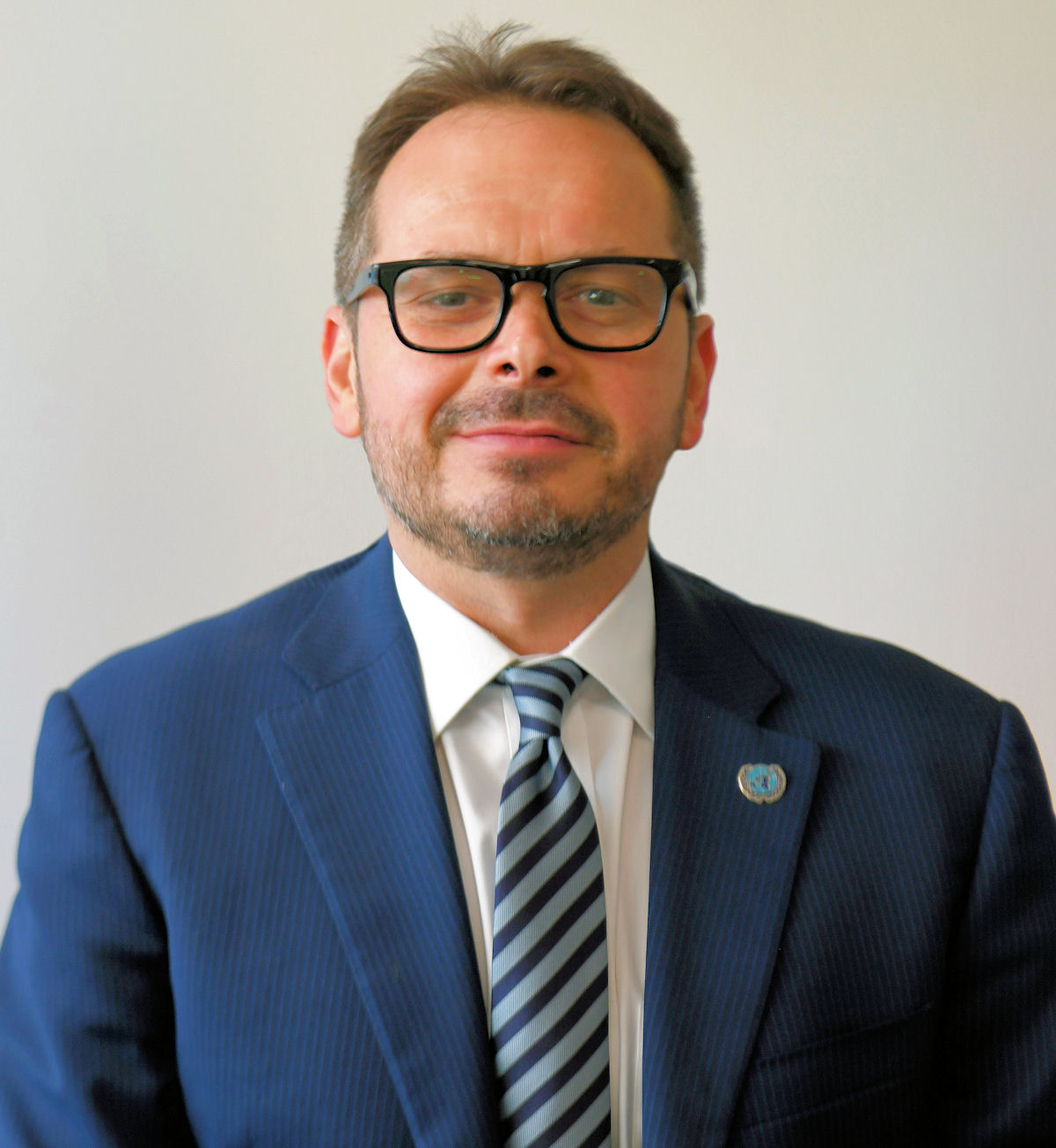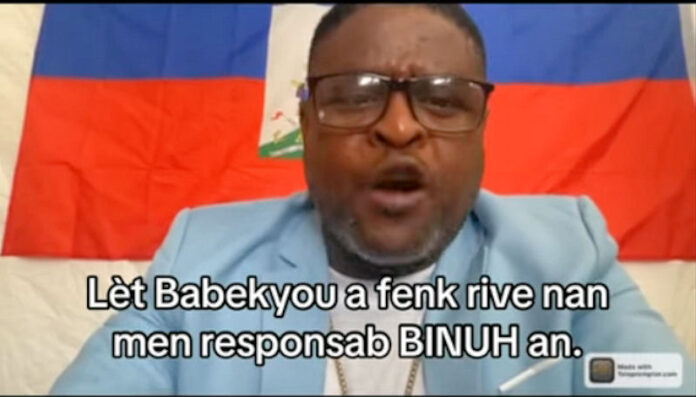We are publishing this Aug. 19, 2025 letter from Viv Ansanm leader Jimmy Chérisier to the new BINUH Chief Carlos Ruiz-Massieu for its historical importance. It is the first time Chérisier has articulated in written form his analysis of recent Haitian history. In the letter, he stresses the need for truth and accountability in resolving Haiti’s crisis, asserting that lasting peace will only come from addressing the root causes of the violence (imperialism and the elites), not through external interventions or piecemeal solutions.
Viv Ansanm Political Party
Date: Thursday, August 19, 2025
To the attention of Mr. Carlos Gabriel Ruiz-Massieu Aguirre, Special Representative of the United Nations Secretary-General and Head of the United Nations Integrated Office in Haiti (BINUH).
Subject: Historical truth and strategic reflection on the Haitian crisis
Dear Special Representative of the United Nations Secretary-General in Haiti,
I am writing this letter with respect and honesty, aware that every word will carry weight in this context, where official accounts tend to obscure the root causes of the Haitian crisis. Haiti did not descend into chaos by accident.
I am writing to you with the certainty that your appointment as Special Representative of the UN Secretary-General and Head of BINUH represents an opportunity for Haiti. With more than 30 years of experience in diplomacy and public service, including leading the UN Verification Mission in Colombia, overseeing the implementation of the peace agreement with the FARC-EP, and conducting dialogues with other armed groups, you have valuable expertise for the context prevailing in Haiti. As a lawyer by training, with a master’s degree in political science specializing in Latin America, and a polyglot (Spanish, English, French), you embody the ideal academic and professional profile to help Haiti move toward peace, stability, and development.
What is happening in Haiti is the result of a long historical chain of events in which two elites—economic and political—irresponsible in their use of power, have created, structured, financed, and exploited armed violence as a tool for social, economic, and political control.
In the 1960s, this mechanism took shape with the creation of the Volontaires de la Sécurité Nationale (VSN), known as the Tonton Makout, a veritable state gang that institutionalized political repression under the regime of François Duvalier and his successor, his son Jean Claude Duvalier. This militia, directly armed and protected by the government, served to intimidate, neutralize, and sometimes eliminate opponents, while ensuring the preservation of the economic interests of a complicit private sector.
After the fall of the Duvalier dictatorship, the country did not return to peace. In the early 1990s, following a coup d’état, an authoritarian and totalitarian military regime was established under the command of the Commander-in-Chief of the Haitian Armed Forces, Raoul Cédras. Under his orders and leadership, Emmanuel “Toto” Constant established the Armed Revolutionary Front for the Progress of Haiti (FRAPH). This paramilitary group, active between 1992 and 1994, perpetrated massive violence against supporters of President-elect Jean-Bertrand Aristide, who was exiled after the coup. The FRAPH benefited from logistical and financial support from local economic circles, foreign allies, and even international intelligence agencies.
This same military regime then created the NINJAS, a criminal organization led by military officer Michel François and comprising well-known figures in Haitian national life such as Roméo Halloun, Fahed Esper, Michel Martelly, Hugues Paris, among others… This organization, like those that preceded it, was not a spontaneous creation of the Haitian streets but an instrument fashioned by the government and the economic elite to control, repress, and intimidate the masses.
After three years in exile in the United States, President Aristide returned to the country and ordered the dissolution of the Haitian Army in 1994, depriving the country of its defense forces without putting in place an alternative mechanism for public and national security. It should be noted that when President Aristide dissolved the Haitian Armed Forces, he did so in a very clumsy manner, both in substance and in form.
In substance, because he did not follow the legal procedures for doing so: it was primarily an emotional decision rather than an institutional one.
In terms of form, the execution was just as problematic, since the soldiers simply went home, taking the army’s arsenal with them. It was a real administrative disaster. I am convinced that if they did not take tanks, artillery pieces, or fighter planes with them, it was simply because it was impossible to conceal them.
As a result of this decision, a very high percentage of the Haitian army’s weapons ended up in circulation among the civilian population, fueling ongoing insecurity and disorder in the country. The institutional and security vacuum is exploited by former military personnel who were laid off and formed the Zenglendos, an unorganized armed group specializing in armed robbery, nighttime hold-ups, rape, among other crimes, creating a climate of fear in urban and peri-urban areas.
From 2001 onwards, under the same president Aristide, re-elected by universal suffrage, Haiti saw the emergence of several paramilitary groups from working-class neighborhoods, used for political abuses: the Chimères, later renamed Rat pa kaka, comprising Lame Wouj (the Red Army), Lame Ti Manchèt (the Little Machete Army), Bale Wouze, Si a Meto, and other factions, often mobilized against opponents or for territorial control operations. These groups, like their predecessors, were tolerated or encouraged as long as they served the interests of a fringe element of political and economic power.
The earthquake of January 12, 2010 killed more than 250,000 people, displaced more than 1.5 million Haitians, and destroyed nearly 60% of the capital’s administrative infrastructure administrative infrastructure of the capital. This event brought the Haitian state to its knees: institutions, already weakened, found themselves unable to manage social, health, and economic emergencies. In this institutional vacuum, marked by an increased dependence on international aid and weakened governance, latent insecurity has gradually transformed into a structured reality.
Small armed groups, once marginal, have taken advantage of the state’s weakness to strengthen themselves, laying the foundations for the large-scale gangsterization that dominates the national scene today. This phenomenon is supported directly or indirectly by a predatory segment of the economic class that is still present and, of course, by segments of the political class. The same networks that yesterday formed, armed, and used these forces now label them “terrorists” for having completely escaped their control.
The cycle is always the same: a group is created, used, demonized, destroyed, then replaced by another under a different name, with the same formula and, too often, the same faces at its head. The root causes—poverty, social exclusion, extractive economy, institutional collapse—are never addressed but rather exploited. The hands behind this violence are never questioned; only the pawns, the comrades who are always met and used in secret, are pointed out to the public.

To this tragic picture we can add the plots against non-insane members of society alienated members of the legal bodies: I will illustrate this with my own experience. I was first wrongly accused of a massacre that took place in the working-class neighborhood of La Saline on November 13, 2018, an accusation that was fabricated and presented in reports by two politicized human rights organizations, which, far from seeking the truth, worked to destabilize the country through soft power methods: The National Human Rights Defense Network (RNDDH), a private company owned by Mr. Pierre Lesperance, and the Fondasyon Je Klere (FJKL), also a private company owned by Marie Yolène Gilles and lawyer Samuel Madistin.
Following the allegations reported in these reports, the United Nations imposed sanctions against me in October 2022 without any supporting investigation. More recently, in August 2025, the Trump administration put a price on my head, offering a $5 million reward to anyone who participated in my capture. This stigmatization is part of a clear logic: to silence those who disturb Western interests in Haiti, interests that align with those of the local wealthy class and part of the traditional political class.
But one thing is certain: my greatest desire is to bring this country out of chaos. I will never stop fighting for national dialogue and a return to sovereignty, which alone can guarantee real solutions to Haiti’s problems. This is the only possible way to treat the wound that Haiti has become for the Caribbean and the continent.
In this context, my position has been to play a role that some refuse to understand: where fear and repression have failed, I have sought to awaken the conscience of those who were born and raised on the margins of society, separated by a divide imposed by the system. This approach has made me the target of a strategy of delegitimization: selective criminalization, spectacular sanctions, media demonization, and diplomatic isolation. It is not me personally who is disturbing, but the threat posed by my words, which are capable of linking present injustices to past injustices and attributing them to their true perpetrators.
Mr. Special Representative of the United Nations Secretary-General in Haiti, I know that your mission requires caution and skill, but I believe that it must also assume a duty to truth. This truth recognizes the role of Haitian elites in creating and perpetuating violence, the historical continuity of state gangs, and the impacts of international policies that, intentionally or not, have consolidated a neocolonial order in Haiti.
Haiti does not need externally dictated interventions that constantly reproduce the same patterns. It needs an authentic national dialogue, where solutions to Haitian problems are conceived, discussed, and implemented by Haitians. Without this, the cycle will continue: one group will be destroyed, another will emerge, and the real beneficiaries will remain the same.
Haiti will be a shared paradise or a common hell. Lasting peace will not come from attempts to eliminate one armed group at a time or from an imposed consensus, but from social justice, restored sovereignty, and an economy focused on production and inclusion.
I am writing to you not to provoke, but to invite you to reconsider how this crisis is being interpreted, and to ensure that BINUH’s actions are based on a sincere recognition of the historical and political complexity of our country. I remain available for direct discussion, convinced that only the truth, even when expressed with caution, can provide a solid foundation for building peace.Please accept, Mr. Special Representative of the United Nations Secretary- General in Haiti, the assurance of my highest consideration.
Jimmy Chérisier
President and Spokesperson of the Viv Ansanm Political Party










